完整word版,牛津英语上海版六年级下册知识点整理,推荐文档
牛津英语上海版六年级下学期第5单元词汇
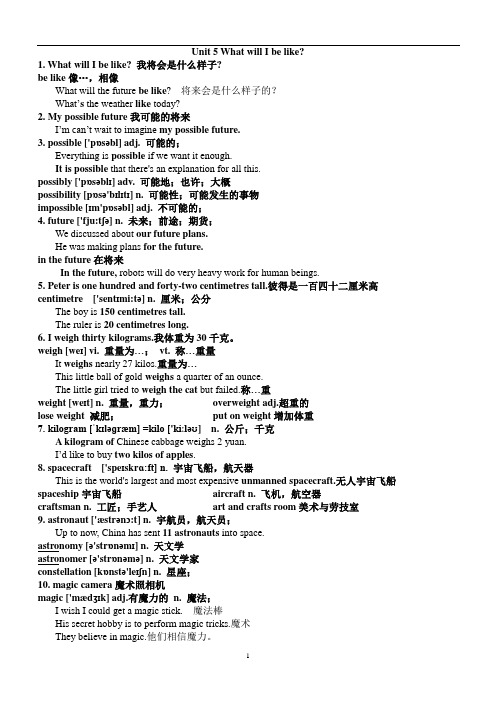
Unit 5 What will I be like?1. What will I be like? 我将会是什么样子?be like像…,相像What will the future be like? 将来会是什么样子的?What’s the weather like today?2. My possible future我可能的将来I’m can’t wait to imagine my possible future.3. possible ['pɒsəbl] adj. 可能的;Everything is possible if we want it enough.It is possible that there's an explanation for all this.possibly ['pɒsəblɪ] adv. 可能地;也许;大概possibility [pɒsə'bɪlɪtɪ] n. 可能性;可能发生的事物impossible [ɪm'pɒsəbl] adj. 不可能的;4. future ['fju:tʃə] n. 未来;前途;期货;We discussed about our future plans.He was making plans for the future.in the future在将来In the future, robots will do very heavy work for human beings.5. Peter is one hundred and forty-two centimetres tall.彼得是一百四十二厘米高centimetre ['sentɪmi:tə] n. 厘米;公分The boy is 150 centimetres tall.The ruler is 20 centimetres long.6. I weigh thirty kilograms.我体重为30千克。
上海版牛津英语6A知识点整理
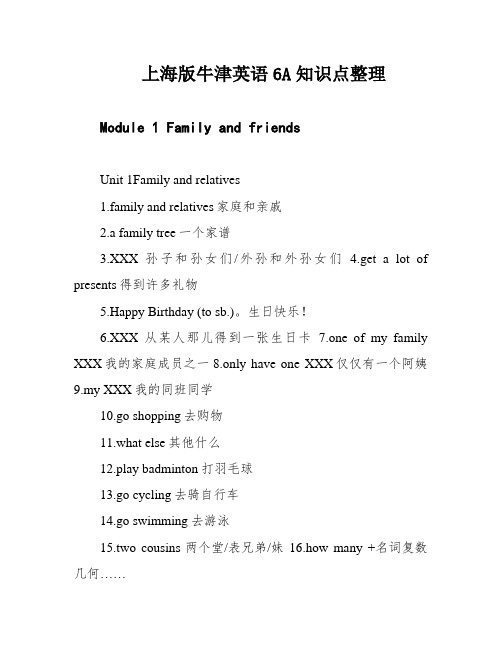
上海版牛津英语6A知识点整理Module 1 Family and friendsUnit 1Family and relatives1.family and relatives家庭和亲戚2.a family tree一个家谱3.XXX孙子和孙女们/外孙和外孙女们4.get a lot of presents得到许多礼物5.Happy Birthday (to sb.)。
生日快乐!6.XXX从某人那儿得到一张生日卡7.one of my family XXX我的家庭成员之一8.only have one XXX仅仅有一个阿姨9.my XXX我的同班同学10.go shopping去购物11.what else其他什么12.play badminton打羽毛球13.go cycling去骑自行车14.go swimming去游泳15.two cousins两个堂/表兄弟/妹16.how many +名词复数几何……语言点1.This is my XXX.这是我的(外)祖父。
These are my family and relatives.这些是我的家人和亲戚。
留意句中各身分坚持单复数同形。
2.I‟m their son。
我是他们的儿子。
We‟re their sons.我们是他们的儿子。
3.How many uncles do you have?你有几何个叔叔?How many背面接可数名词的复数方式。
4.What do you do with your…?你和你的…干什么?5.What else do you do with your…?你和你的…还干什么?6.What else do you do with your…?你和你的…还干甚么?With是个介词,背面接人称代词时,要用宾格的形式。
With me/him/her/it/us /them7.always/sometimes/usually是频度副词,发问应当要用How often…?Unit 2I have a good friend1.help each other互相帮助2.help other people = help XXX匡助他人3.not…at all根本不4.go out at night在早晨进来5.like to be XXX喜欢在一起6.XXX7.be friendly8.XXX9.work hard = study hard10.be late for school11.get angry12.be kind to others13.XXX.14.XXX15.XXX16.a visit to sp.17.live in the USA = live in America18.visit sp。
(完整版)上海版牛津英语六年级下册6B重点知识点复习整理(最新整理)

(完整版)上海版牛津英语六年级下册6B重点知识点复习整理(最新整理)上海版牛津英语六年级下册6B重点知识点复习整理Module 1 City LifeUnit 1 Great cities in Asia【知识点梳理】1.方位词:east / west / north / south / north-east / north-west / south-east / south-west用法:a. 两地不相邻: e.g. A is north B. (= to the south of)b. 两地接壤: e.g. A is on the north of B.c. 所属关系,A包含B, B属于A: e.g. B is in the north of A.2. by + 交通工具表示“乘……交通工具”, 用how进行提问e.g. by bus / ferry / train / ship / underground… by plane = by air, by ship = by sea3. How far…多远(询问距离的远近,路程的长短)e.g. Hoe far is it from your home to school? 从你家到学校有多远?4. How long…多长,多久(询问时间的长短,提问一段时间)e.g. How long does it take to travel from Shanghai to Beijing by train? 坐火车从上海到北京要花多长时间?5. It takes (sb.) some time to do sth. 做某事需要花费多少时间e.g. It takes me five hours to make this modal plane. 做这个模型飞机花了我5个小时。
6. like / love / enjoy doing sth. 喜欢做某事e.g. The people in Bangkok like / love / enjoy eating spicy food. 曼谷人喜欢吃辛辣食物。
上海版沪教版牛津英语六年级英语作文总结精选全文完整版

可编辑修改精选全文完整版Changes in our lives(unit2)Our country, China is getting stronger and stronger. Our life is getting better and better. There are many changes in our lives. In the past,people washed clothes by hand. Now people use a washing machine. In the past,people watched black and white TV. Now people watch colour TV. In the past, people wrote letters. Now people write emails.Changes in my school(unit3)My school was small and old. There were only 5 classrooms. There was a small library. Now my school is small,but it is new. There are 10 classrooms. There is a big library. There are many kinds of books in it. In the future, our school will be bigger. We will have lessons on the computer. I hope our school will be better and better.My favourite picture(unit4)My favourite picture is Sunflowers. It is a picture by Vincent van Gogh. It’s an oil painting.In this picture, there are many sunflowers in the vase. I like this picture because it’s beautiful.My favourite activity(unit6)We have two PE lessons at school every week. In PE lessons, I like playing football. I am a football fan. I usually play football with my friends after school. I like playing football because it helps me stay healthy and fit.Helping others(unit7)Better city,better life.How can you help others?At home, we can clean the table and read the newspaper to old people.At school, we can put rubbish in the bin and keep our classroom clean at school.We can give our seats to old people on the bus. We can help tourists find their way and help the blind cross the street on the street.Rules in the library(unit8)In the library, we should keep quiet. We should love the books. We should not draw on the desks. We should not litter. We should not smoke.How can we reuse paper(Unit9)We can write on both sides. We can stick old envelopes together. Then we put cards or photos in it. We can reuse a gift box and put toys and crayons in it.My favourite story(unit10)My favourite story is “The ugly duckling”. Andersen wrote the story. The story is about an ugly duckling. He becomes a beautiful swan. I like this story because it’s interesting.My favourite festival(unit 11)My favourite festival is Christmas. It’s on 25th December. At this festival, people give presents to each other. Children wait for presents from Father Christmas onChristmas Eve. I like this festival because it’s interesting.。
沪教版六下英语单元知识汇总
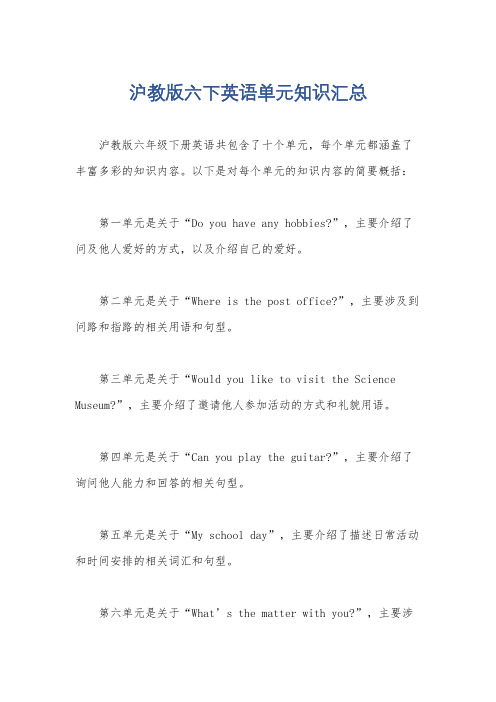
沪教版六下英语单元知识汇总沪教版六年级下册英语共包含了十个单元,每个单元都涵盖了丰富多彩的知识内容。
以下是对每个单元的知识内容的简要概括:第一单元是关于“Do you have any hobbies?”,主要介绍了问及他人爱好的方式,以及介绍自己的爱好。
第二单元是关于“Where is the post office?”,主要涉及到问路和指路的相关用语和句型。
第三单元是关于“Would you like to visit the Science Museum?”,主要介绍了邀请他人参加活动的方式和礼貌用语。
第四单元是关于“Can you play the guitar?”,主要介绍了询问他人能力和回答的相关句型。
第五单元是关于“My school day”,主要介绍了描述日常活动和时间安排的相关词汇和句型。
第六单元是关于“What’s the matter with you?”,主要涉及到询问他人健康状况和表达自己的不适。
第七单元是关于“Where did you go on vacation?”,主要介绍了谈论假期活动和经历的相关词汇和句型。
第八单元是关于“Have you ever been to a zoo?”,主要涉及到谈论过去的经历和经历过的事情。
第九单元是关于“What will you do if it rains?”,主要介绍了表达假设和条件的相关句型。
第十单元是关于“Let’s celebrate!”,主要涉及到邀请他人参加活动和表达祝贺的相关用语和句型。
每个单元都包含了词汇、语法、对话和阅读等方面的内容,通过这些内容的学习,学生可以全面提高他们的英语能力。
希望这个简要概括能够帮助你对这些单元的知识内容有一个整体的了解。
(完整word版)新人教版六年级英语下册第一单元至第四单元知识点归纳,推荐文档
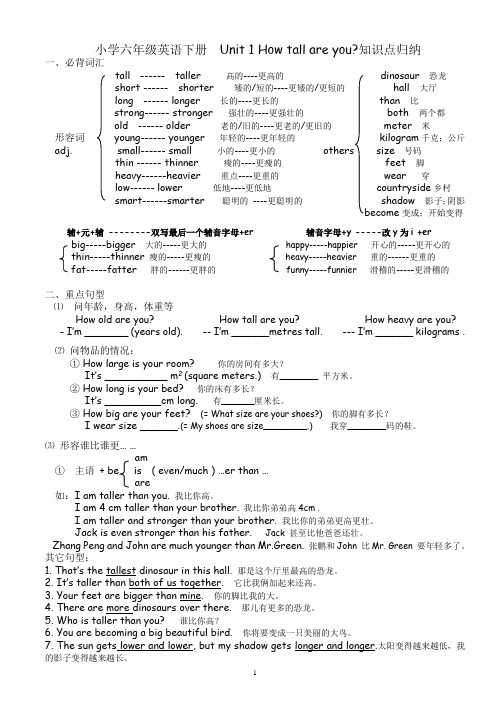
小学六年级英语下册Unit 1 How tall are you?知识点归纳一、必背词汇tall ------ taller 高的----更高的dinosaur 恐龙short ------ shorter 矮的/短的----更矮的/更短的hall 大厅long ------ longer 长的----更长的than 比strong------ stronger 强壮的----更强壮的both 两个都old ------ older 老的/旧的----更老的/更旧的meter 米形容词young------ younger 年轻的----更年轻的kilogram千克;公斤adj. small------ small 小的----更小的others size 号码thin ------ thinner 瘦的----更瘦的feet 脚heavy------heavier 重点----更重的wear 穿low------lower低地----更低地countryside乡村smart------smarter聪明的----更聪明的shadow 影子;阴影become变成;开始变得辅+元+辅 --------双写最后一个辅音字母+er辅音字母+y -----改y为i +erbig-----bigger 大的-----更大的happy-----happier 开心的-----更开心的thin-----thinner瘦的-----更瘦的heavy-----heavier 重的------更重的fat-----fatter 胖的------更胖的funny-----funnier 滑稽的-----更滑稽的二、重点句型⑴问年龄,身高,体重等How old are you? How tall are you? How heavy are you?- I’m _______ (years old). -- I’m ______metres tall. --- I’m ______ k ilograms .⑵问物品的情况:① How large is your room? 你的房间有多大?It’s __________ m2 (square meters.) 有_______ 平方米。
完整版)六年级英语语法知识点汇总
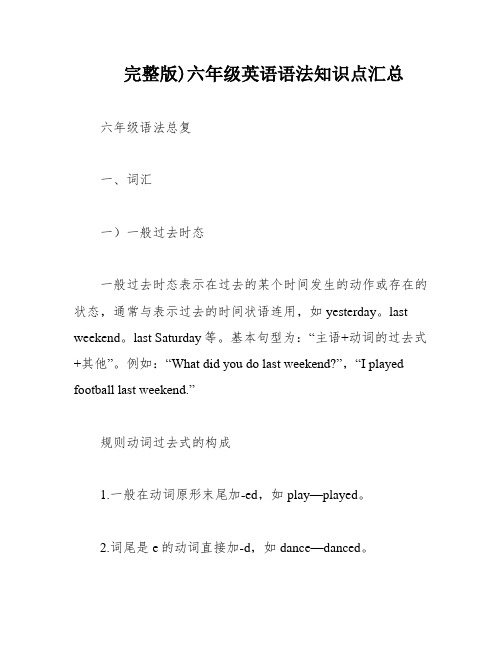
完整版)六年级英语语法知识点汇总六年级语法总复一、词汇一)一般过去时态一般过去时态表示在过去的某个时间发生的动作或存在的状态,通常与表示过去的时间状语连用,如yesterday。
last weekend。
last Saturday等。
基本句型为:“主语+动词的过去式+其他”。
例如:“What did you do last weekend?”,“I played football last weekend.”规则动词过去式的构成1.一般在动词原形末尾加-ed,如play—played。
2.词尾是e的动词直接加-d,如dance—danced。
3.末尾只有一个辅音字母的重读闭音节词,先双写这个辅音字母,再加-ed,(停止)ped。
4.结尾是“辅音字母+y”的动词,变“y”为“i”,再加-ed,如study--studied。
一些不规则变化的动词过去式am/is—was,are—were,see—saw,take—took,read—read,sleep(睡觉)—slept,go—went,come—came,swim—swam,fly—flew,e—became,do—did,get—got,have—had,draw—drew,say—said,hurt—hurt,win—won,tell—told,will—would,eat—ate,cut(切)--cut,sit(坐)—sat,think—thought,find—found,make—made,drink—drank,run(跑)—ran,wear—wore,begin(开始)—began,buy—bought,give(给)—gave,sing—sang。
二)一般现在时态一般现在时态表示包括现在时间在内的一段时间内经常发生的动作或存在的状态,表示惯性或客观存在的事实和真理,通常与often。
always。
usually。
sometimes。
初中英语 牛津上海版六年级下册Unit7 Travelling in Garden City知识点梳理

牛津英语6BUnit7 Travelling in Garden City知识点梳理I. 词性转换1. travel v. 旅行—travelling n. 交通—﹡traveller n. 旅行者e.g. Travelling in Shanghai will be more and more convenient.The Bund attracts many travelers to take photos there.2. conductor n. 售票员—*conduct v. 指挥,进行e.g. The manager asked him to conduct the meeting3. collect v. 收集—collection n. 收集e.g. Mr. Grey is interested in art and he has a large collection of paintings.4. driver n. 司机—drive v. 驾驶e.g. My father drives me to school every day.5. crossing n. 十字路口—cross v. 穿过—across prep. 越过e.g. Don’t cross the road when the traffic light is red.The old lady was walking across the road carefully.6. discuss v. 讨论—discussion n. 讨论e.g. We had a discussion on language and communication7. air-conditioned adj. 有空调设备的—air-conditioner n. 空调e.g. He's going to install an air-conditioner in the house.8. park v. 停车—park n. 公园/停车库e.g. I have to look for a car park to park my car.9. little adj. 很少的—less (比较级) 更少的e.g. He promised to have less fast food to keep healthy.10. few adj. 很少的—fewer (比较级) 更少的e.g. Helen made a few mistakes in her test paper. But Jane made fewer than her.11. many ∕much adj. 许多的—more (比较级) 更多的e.g. Nowadays you can find more tall buildings in Shanghai.III. 语言点/句型1. What will travelling in our city be like in 10 years’ time?=How will travelling in our city be in 10 years’ time?What …be like? …怎么样?be like∕look like 中like prep. 像…一样e.g. Our school is like a garden. like prep. 像…一样She looks like her mother.He likes reading detective stories, like v. 喜欢2. in 10 year s’ time =in 10 years 十年后(常与一般将来时连用)◆in one year’s time◆用How soon 提问e.g. The young man will finish riding around the country in two years’ time.How soon will the young man finish riding around the country?3. there be 句型表示事物的存在在什么地方有什么一般现在时:There is∕are一般过去时:There was∕were一般将来时:There will be/ There is going to be4. all of∕most of∕some of∕none of◆all of∕most of∕some of做主语时,后面的名词为复数,谓语动词也为复数e.g. All of the students wear school uniforms.◆none of做主语时,既可用复数谓语动词,也可用单数谓语动词e.g. None of us enjoy(s) getting up early.﹡复习one of的用法﹡可补充与both of∕either of∕neither of 的比较5. in the past∕nowadays∕in 10 years’ time分别与一般过去时,一般现在时,一般将来时连用e.g. In the past, people usually went to work by bike.Nowadays, people go to work by underground.In 10 years’ time, people will drive to work themselves.6. 比较级:little—less, few—fewer, many∕much—more◆fewer traffic jams∕less traffic7. have to do 不得不◆否定形式:don’t have to do = needn’t do∕don’t need to do 不需要e.g. I have to stay at home. I don’t have to stay at home.◆和must 的区别have to do —强调客观的需要,有人称,时态的变化must —强调主观的意愿,没有人称,时态的变化e.g. He broke his leg, so he had to lie in bed for several days.She must study hard, because she wants to be a doctor.8. perhaps= maybe, possibly 也许,可能9. travel by bus=take a bustravel by underground= take the underground10. instead和instead of◆instead单独用于句首句尾,是副词◆instead of 用于名词,代词或介词短语前e.g. I don’t like the red one, give me the black one instead.= Give me the black one instead of the red one.11. transportation n. (美)= transport n.(英)交通工具12. 动词与介词的搭配buy … from 从…买collect … from从…收集put … in把…放入13. a woman driver— five wom e n driver sa man teacher— two m e n teacher s*a girl student — some girl students。
上海版牛津英语6B六年级基础语法复习整理

形容词比较级最高级<一>规则变化A. 单音节和不可拆双音节形容词1.以e结尾+r / sthuge-huger/hugestlarge- larger- largestsafe- safer- safest2.辅音字母+y结尾:去y + ier / iestheavy-heavier-heaviestdirty- dirtier- dirtiesthappy-happier-happiestearly-earlier-earliestfriendly-friendlier-friendliestangry-angrier-angriesthealthy-healthier-healthiesteasy-easier-easiest3.重读闭音节,以一个元音字母加一个辅音字母结尾:双写辅音字母+ er,est big-bigger- biggestfat- fatter- fattestthin- thinner- thinnesthot- hotter- hottestwet- wetter- wettestred- redder- reddeststrong young old short clever newgreattallhighcheappoorrichsmallslowfastlightB. 部分双音节形容词, 多音节形容词famous- more famous- the most famousmodern – more modern – the most moderncareful- more careful- the most carefulbeautiful-more beautiful-the most beautifulexpensive – more expensive (less expensive)- the most expensive interesting- more interesting- the most interesting<二>不规则变化good/well-better –bestbad/badly/ill-worse-worstlittle-less-least + u. n. (few-fewer-fewest) + c. n.many/much-more –mostfar-farther-farthest (距离)far-further-furthest(程度)<四>too, very, quite, so, as…as,not as /so…as, less …修饰形容词原级very/quite tall(很高),too tall(太高)so tall(如此高)as tall as(与某人一样高)not as tall as /not so tall as(不如某人高)= less tall注意事项:1、形容词最高级前必须加the;副词最高级前可加the,也可不加thee.g. the biggest cities;draw (the) best2、much可修饰比较级:……得多e.g. much taller ……高得多3、原级标志:very非常;too太;quite相当;(not)as+原级+as (不)像……一样;less+原级不如……;so如此(共五个)时态填空(一) 常用固定词组:A型. doinglike doing/ love doing/ enjoy doing 喜欢做某事hate doing 讨厌做某事finish doing 完成做某事practise doing 练习作某事start doing / begin doing 开始做某事hat abo ut doing…? / How about doing…? 做某事怎么样?be good at doing 善于做某事be poor at doing 不善于做某事Sb. spend(s) some time doing sth. 某人花时间做某事remember doing 记住做过某事forget doing 忘记做过某事see sb. doing 看见某人正在做by doing 通过做某事by not doing通过不做某事stop doing 停止做某事instead of doing 而不是做某事go doingB型. to dowould like to do / want to do 想要做某事forget to do 忘记要做某事remember to do 记得要做某事have/has to do不得不做某事had to do不得不做某事will have to do 将不得不做某事plan to do 计划做某事ne's job is / was to do... 某人的工作是做某事like to do/love to do 喜欢做某事start to do / begin to do 开始做某事need to do 需要做某事don’t need to do/ don’t have to do 不需要做某事learn to do 学习做某事promise to do / promise not to do 保证做某事/保证不做某事tell sb. to do / tell sb. not to do 告诉某人做某事/告诉某人不做某事ask sb. to do / ask sb. not to do 叫某人做某事/叫某人不做某事It takes/took sb. some time to do sth.某人花时间做某事It’s time to do sth. 做某事的时间到了C型. doLet sb. do 让某人做help sb. (to) do 帮助某人做hy not do...? 为何不做......?would rather do / would rather not do 宁愿做/宁愿不做had better do / had better not do 最好做/最好不做can do 能做may do 可以做must do 必须做will do 将要做would do 想要做shall do 应该做should do 应该做can't do 不能做may not do 不可以做mustn't do 不准做won't do 将不做wouldn't do 将不做shan't do 将不做shouldn't do 不应该做needn’t do 不需要做(二) 五种常见时态:现在进行时公式:am/is/are +doing (现在分词)时间状语:now 现在listen 听look 看these days 最近eg.Look, they are planting trees.一般现在时(助动词do/does)公式:V. / V.+s/es/ies (动词原形或动词第三人称单数)时间状语:always 一直usually 经常often 常常sometimes 有时候once a week 每周一次four times a day 一天四次every year 每年How often 多久一次e.g.I usually take an underground to school.He often takes a bus home.一般过去时(助动词did)公式:V. +d/ed/ied或不规则(动词过去式)时间状语:yesterday 昨天yesterday evening 昨天晚上ten years ago 十年前last week 上个星期in the past 在过去just now 刚才e.g.Ten years ago, he moved to Japan.I sent a letter just now.4. 一般将来时(助动词will/shall)公式:am/is/are going to +V. , will /shall +V. 时间状语:tomorrow 明天next week 下个星期this weekend 这个星期in the future 在将来Soon 很快,不久in 15 years’ time 在15年后How soon 多久以后e.g.I will fly to America tomorrow.现在完成时(助动词have/has)公式:have/has +done (过去分词)时间状语:already 已经yet 尚never 从未ever 曾经just 刚才once 一次before 在......之前for 6 years 6年how long 多久e.g.I haven’t read this newspaper yet.ary has already packed her things.(3)用户得到的电功率即降压变压器的输出功率为P 用=P-P 损=P(1-4%)=100×96% kW=96 kW.【答案】(1)1 :20 240 :11 (2)见解析图(3)96kW6.有条河流,流量Q=2 m3/s,落差h=5 m,现利用其发电,若发电机总效率为50%,输出电压为240 V,输电线总电阻R=30 Ω,允许损失功率为输出功率的6%,为满足用电的需求,则该输电线路所使用的理想的升压、降压变压器的匝数比各是多少?能使多少盏“220 V,100 W”的电灯正常发光?(取g=10 N/kg)【解析】设ρ为水的密度电源端:P 输出=mgh/t×50%=Qρgh×0.5=2×1×103×10×5×0.5 W=5×104 W.输出电压U=240 V,输送电路如图所示.送为满足输电要求,据 ΔP 损=I 2R ,有 I 送= ΔP 损/R =P 输出×6%R=5×104×0.0630A =10 A.P 输送 5×1043则送电电压为U 送= I 送 = 10 V =5×10 V.所以升压变压器的变压比为 n :n =U :U 送=240/(5×103)=6 :125.输电线电压损失 ΔU 损=I 送R =10×30 V=300 V.用户端:U =U 送-ΔU 损=5×103 V -300 V =4 700 V.据题意可知,U =220 V ,所以降压变压器的匝数比为 n ′ :4 700 n ′=U:U =220=235 :11.因为理想变压器没有能量损失,所以可正常发光的电灯盏数为 NP 输出-ΔP 损 5×104-5×104×0.06= P 灯 = 100盏=470 盏.【答案】 6 :125 235 :11 470 盏第五章交变电流章末检测时间:90 分钟分值:100 分第Ⅰ卷(选择题共48 分)一、选择题(本题有12 小题,每小题4 分,共48 分.其中1~9 题为单选题,10~12 题为多选题)1.对于如图所示的电流i 随时间t 做周期性变化的图象,下列说法中正确的是( )A.电流大小变化,方向不变,是直流电B.电流大小、方向都变化,是交流电C.电流的周期是0.02 s,最大值是0.2 AD.电流做周期性变化,是交流电【解析】方向随时间做周期性变化是交变电流最重要的特。
牛津英语上海版六年级第二学期课件

We get wood from trees.
2.What can we use glass to make?
We can use wood to make chopsticks.
3.What is it made of?
It’s made of…
Teaching difficulties
Using the key sentence pattern in the context
3. Lose :失去,丢失
常见心律失常心电图诊断的误区诺如 病毒感 染的防 控知识 介绍责 任那些 事浅谈 用人单 位承担 的社会 保险法 律责任 和案例 分析现 代农业 示范工 程设施 红地球 葡萄栽 培培训 材料
Keys for look, read and write
in trees provide/birds ,animals / insects build my home Leaves, flowers/fruit make/furniture/paper/important/ stop
Teaching Contents
Words:
forest area provide build wood cut down wool cotton plastic oil metal sand wooden woollen
Sentence Pattern:
1.What do we get from the environment?
Summary
Word Box
forest area provide build wood cut down wool cotton plastic oil metal sand wooden woolen
牛津英语上海版六年级下册知识点整理

牛津英语上海版六年级下册知识点整理Module1 City lifeUnit1 Great cities in Asian词组:the capital of... ...的首都 north-east东北 from...to...从...到...in the past在过去 the Great Wall长城 more than=over超过eat dumpling吃饺子 tall buildings高楼大厦huge department stores大型的百货商店 a lot of许多语法点:1.Beijing is north of Shanghai.北京在上海的北部。
(1)两地不相邻:A is north of B.(2)所属关系:A is in the north of B.(3)两地接壤:A is on the north of B.2.How far is it from Shanghai to Beijing?从北京到上海有多远?How far... 多远。
询问距离的远近,路程的长远。
3.How long does it take to travel from Shanghai to Beijing by train?坐火车从上海到北京要多久?(1)How long...多久。
询问时间长短。
How long…多长。
用于询物的问长度。
(2)by+交通工具,表示“乘...交通工具”,用How提问。
4.It takes about ten hours.大约需要十小时It takes (sb.) st. to do sth. 做某事需要花费多长时间。
5.They enjoy eating dumplings.他们喜欢吃饺子enjoy/like/love doing sth. 喜欢做某事6.Two and a half days=Two days and a half两天半Half an hour=one and a half hours=one/an hour and a half一个半小时Unit2 At the airport词组:plane ticket机票 silk scarf丝巾 a lot of/plenty of大量的,许多departure time出发时间 leave for出发去某地 have to不得不be going to将要 arrive at到达boarding card登机牌 name tap姓名语法点:1.Aunt Judy and Uncle Mike have lived in Los Angeles for six years.朱迪婶婶和迈克叔叔在洛杉矶已住了六年。
Unit8教案2023-2024学年牛津英语上海版六年级下册

本节课的核心素养目标旨在提高学生的语言能力、思维品质、文化意识和学习策略。通过学习有关动物的知识,学生能够运用所学的词汇和句型进行交流和表达,提高他们的语言实践能力;通过观察、分析和思考动物的特点和保护,培养他们的思维品质;了解不同文化背景下的动物认知和保护,增强他们的文化意识;同时,通过本节课的学习,学生能够掌握有效的学习策略,提高他们的自主学习能力。总之,本节课的核心素养目标是培养学生的语言能力、思维品质、文化意识和学习策略,使他们能够在真实的情境中运用所学知识,提高他们的英语素养。
Unit8 教案2023-2024学年牛津英语上海版六年级下册
课题:
科目:
班级:
课时:计划1课时
教师:
单位:
一、教材分析
Unit8 教案2023-2024学年牛津英语上海版六年级下册。本单元主要围绕“动物”主题展开,通过学习,让学生掌握有关动物的词汇,如panda, tiger, elephant等,同时能够运用所学的句型进行简单的交流和表达。课本通过图片、对话和故事等形式,激发学生的学习兴解决办法
本节课旨在通过学习有关动物的知识,培养学生的语言能力、观察力和跨文化交际意识,提高他们的英语素养。具体核心素养目标如下:
1. 语言能力:学生能够掌握并运用本节课所学动物相关词汇,如panda, tiger, elephant等,同时能够运用所学的句型进行简单的交流和表达。
2. 观察力:学生通过观察图片、视频等教学素材,培养观察力,并能将其与所学知识相结合。
3. 跨文化交际意识:学生在学习过程中了解不同文化背景下的动物认知和保护,提高跨文化交际意识。
4. 合作与交流:通过小组合作、角色扮演等活动,培养学生与他人合作、交流的能力,提高团队协作能力。
【最新】六年级下册单词、课文中译英(上海版牛津英语)

六下 Module 1 U nit 1巨大的;伟大的 great 亚洲 Asia日本 Japan 东京 Tokyo 泰国 Thailand 曼谷 Bangkok西北 north-west 东北 north-east 东南 south-east西南 south-west 展览会 exhibition 首都 capital(大)船;舰 ship多远 how far 千米,公里 kilometre旅行 travel 博物馆 museum宫殿 palace游客,观光者 tourist多于;超过 more than 百万 million欣赏;喜爱 enjoyUnit 2机场 airport票;入场券登机牌 ticket 手提箱 suitcase 丝绸 silk 围巾;头巾scarf 洛杉矶 Los Angeles以前 before停留;呆 stay 几个 several然而 however 装(箱) pack足够的,充足的航班 enough 空间 space去... leave for... 应该 should到达... arrive at... 不得不 have to担心 worry离开,出发 departure 航班 flight乘客;旅客 passenger 护照 passport 登机牌 boarding card带来 bring元(美国,加拿大等货币) dollar 地址 addressUnit 3端午节 Dragon Boat Festival 比赛 race某物,某事 something 庆祝 celebrate 出生(be )born一千 thousand 以前 ago 国家 country 很,非常 very much 劝告,忠告 advice向...提出建议 give advice to...国王 king接受(某人的)劝告 take one ’s advice死,死亡 die 以后,后来 later 输掉,失去 lose战役 battle处于危险中 in danger河,江 river 农历的 lunar 纪念,记得 remember 有,带有 with没有 without 月饼 moon cake甜食,甜点,布丁 pudding 宁愿 would ratherUnit 4 保持 stay 保持健康 stay healthy 室内的 indoor 室外的 outdoor 篮球 basketball 电影,胶片 film 网球 tennis 模型 model去野餐 go on a picnic 邮票 stamp 烧烤野餐 barbecue来一次烧烤野餐 have a barbecue 头痛 headache 胃痛 stomach ache 牙痛 toothache 感冒 cold 发烧 fever 疼痛的 sore 咽喉 throat锻炼,运动 exercise 真正的,的确 really体育运动 sport 忘记 forgetModule 2 Unit 1 在...前面 in front of 有魔力的 magic 寻找 look for 开始 start按钮 button纸币,注释 note 按,压 press 微笑,笑 smile 背面,反面 back...年后 in...years ’time 重的 heavy 厘米 centimetre有...重,称...的重量 weigh 千克,公斤 kilogram宇航员 astronaut 同意 agree 擅长(be )good at 灭火 put out fires 可能的 possibly 苗条的 slim(外貌)好看的 good-looking不擅长,...差的(be )poor at 数学 Maths 练习,训练 practise 学,学习 learn 航天器,宇宙飞船 spacecraft 回来,返回 come backUnit 2季节性的 seasonal 变化 change 生活 life到处,向各处 around 有空调的 air-conditioned 学习 study食堂,餐厅 canteen 保暖 keep warm雪人 snowman 热饮料 hot drink 通知 notice早期的,早先的 early 袖子 sleeve 裤子 trousers短上衣,夹克衫 jacket短裙 skirt短裤 shorts皮带 belt Unit3双层车 double-decker 车费 fare在过去 in the past售票员 conductor 现今 nowadays 单层车 single-decker 大多数 most 没有一个 none 仍然,依旧,还是 still 也许,大概,可能 perhaps 不多的,很少的 few堵车,交通阻塞 traffic jam 轻便摩托车 motorcycle铁路 railway 停车场 car park 桥 bridge人行横道,十字路口 crossing 公共汽车停靠站 bus stopModule 3 Unit 1(使)下沉,(使)沉没 sink 清洁工人 cleaner 愉快的 happily 起先 at first 温和的 gently 轻微的 slightly 缓慢地 slowly 突然 suddenly 快速的 quickly 立即 immediately台风 typhoon 猛烈的 fiercely行进,移动 pass 小心的 carefully 温和的 gentle 拿着,抓住 hold雨衣 raincoat紧紧的 tightly旗,旗帜 flag进行帆板运动 windsurf盆 pot可能 may物体 object (使)破,碎 break波浪 waveUnit 2四分之一 quarter 小河,溪流 stream 地球 earth 鲸 whale聪明的 intelligent海星 starfish 海马 sea horse 有趣的 interesting 重要的 important 污染,弄脏 pollute 覆盖 cover 如果 if淋浴 shower 洗淋浴 take a shower 农作物 crop使用,利用;用途,功能 use节省,节约 save 浪费 waste 修理 fix 滴(漏)水的 dripping 水龙头 tap 流动的 running 关掉 turn off 代替 instead of 沐浴,洗盆浴 bathUnit 3森林 forest 陆地,土地 land 地区 area 窝,巢 nest 洞,孔 hollow 木头 wood砍倒 cut down 找出,查明 find out 环境 environment塑料,塑料制的,塑料的 plastic油,石油 oil 羊毛 wool 棉花,棉布 cotton 玻璃,玻璃杯 glass 沙 sand 材料 material由...制成的(be )made of 木制的 wooden毛纺的,羊毛的 woollen 一件商品(物品)itemModule 1 U nit 1 巨大的;伟大的亚洲日本东京泰国曼谷西北东北东南西南展览会首都(大)船;舰多远千米,公里旅行博物馆宫殿游客,观光者多于;超过百万欣赏;喜爱Unit 2机场票;入场卷登机牌手提箱丝绸围巾;头巾洛杉矶以前停留;呆几个然而装(箱)足够的,充足的航班空间去... 应该到达... 不得不担心 离开,出发航班乘客;旅客 护照 登机牌带来元(美国,加拿大等货币) 地址Unit 3端午节 比赛 某物,某事 庆祝 出生一千 以前 国家很,非常 劝告,忠告向...提出建议国王接受(某人的)劝告 死,死亡 以后,后来输掉,失去 战役 处于危险中 河,江 农历的 纪念,记得 有,带有 没有 月饼甜食,甜点,布丁 宁愿Unit 4保持保持健康室内的室外的篮球电影,胶片网球模型去野餐邮票烧烤野餐来一次烧烤野餐头痛胃痛牙痛感冒发烧疼痛的咽喉锻炼,运动真正的,的确体育运动忘记Module 2Unit 1 在...前面有魔力的寻找开始按钮纸币,注释按,压微笑,笑背面,反面...年后重的厘米有...重,称...的重量千克,公斤宇航员同意擅长灭火可能的苗条的(外貌)好看的不擅长,...差的数学练习,训练学,学习航天器,宇宙飞船回来,返回Unit 2 季节性的变化生活到处,向各处有空调的学习食堂,餐厅保暖雪人热饮料通知早期的,早先的袖子裤子短上衣,夹克衫短裙短裤皮带Unit3 双层车车费在过去售票员现今单层车大多数没有一个仍然,依旧,还是也许,大概,可能不多的,很少的堵车,交通阻塞轻便摩托车铁路停车场桥人行横道,十字路口公共汽车停靠站Module 3Unit 1 (使)下沉,(使)沉没清洁工人愉快的起先温和的轻微的缓慢地突然快速的立即台风猛烈的行进,移动小心的温和的拿着,抓住雨衣紧紧的旗,旗帜进行帆板运动盆可能物体(使)破,碎波浪Unit 2 四分之一小河,溪流地球鲸聪明的海星海马有趣的重要的污染,弄脏覆盖如果淋浴洗淋浴农作物使用,利用;用途,功能节省,节约浪费修理滴(漏)水的水龙头流动的关掉代替沐浴,洗盆浴Unit 3 森林陆地,土地地区窝,巢洞,孔木头砍倒找出,查明环境塑料,塑料制的,塑料的油,石油羊毛棉花,棉布玻璃,玻璃杯沙材料由...制成的木制的毛纺的,羊毛的一件商品(物品)Module 1 U nit 1great AsiaJapan Tokyo Thailand Bangkoknorth-west north-east south-eastsouth-west exhibition capitalshiphow farkilometretravelmuseumpalace touristmore than millionenjoyUnit 2airportticket suitcase silk scarf Los Angelesbeforestay severalhowever packenough spaceleave for... shouldarrive at... have toworrydepartureflightpassenger passport boarding cardbring dollar addressUnit 3 Dragon Boat Festival race something celebrate (be )bornthousand ago country very much advicegive advice to...kingtake one ’s advice die laterlosebattlein danger river lunar remember withwithout moon cake pudding would ratherUnit 4 stay stay healthy indoor outdoor basketball film tennis modelgo on a picnic stamp barbecue have a barbecue headache stomach ache toothache cold fever soreexercise hroat exercise reallysport forgetModule 2 Unit 1in front of magic look for start button note press smile backin...years ’time heavy centimetre weigh kilogramastronaut agree(be )good at put out fires possibly slimgood-looking(be )poor atMaths practise learn spacecraft come backUnit 2seasonal change life aroundair-conditioned study canteen keep warmsnowman hot drink notice early sleeve trousersjacketskirtshortsbelt Unit3double-decker fare in the pastconductor nowadays single-decker most none still perhaps fewtraffic jam motorcyclerailway car park bridge crossing bus stopModule 3 Unit 1sink cleaner happily at first gently slightly slowly suddenly quickly immediatelytyphoon fiercelypass carefully gentle holdraincoattightly flag windsurfpotmayobject breakwaveUnit 2quarter stream earth whale intelligentstarfishsea horseinterestingimportantpollutecoverifshower take a showercropusesavewaste fix drippingtaprunningturn offinstead ofbath Unit 3forest landareanesthollowwoodcut downfind outenvironmentplasticoilwoolcottonglasssandmaterial(be)made ofwoodenwoollenitemModule 1 City lifeUnit 1 Great cities in Asia郭老师和她的学生们在一个关于亚洲著名城市的展览会上。
Unit7单元知识点(表格形式)牛津上海版(试用本)六年级英语下册

I read books instead of watching TV.
用A代替B
我读书而不是看电视。
12. In the past, there were only singledecker buses.
在过去,只有单层公交车。
13. In the past, there were no airconditioned buses.
23. Perhaps there will be fewer traffic jams.
或许,将会有更少的交通堵塞。
24. Perhaps most of the people will travel by underground.
或许,大部分人将乘地铁出行。
25.Perhaps there will be more underground stations.
buy sth from sb
所有的乘客不得不从售票员那儿买票。
从or collected money from the passengers and put it in a bag.
collect …from…
售票员从乘客那儿收集钱,然后将钱放进袋子里。
从…收集,,
10. On many buses, passengers put their money in a fare box or use a public transportation card instead.
put …in…把…放入…
在许多公交车上,乘客们将钱放进投币箱或者使用公交卡来替代。
instead代替;更换
conduct (v)指挥conductor (n)售票员
crossing (n)十字路口cross (v)穿过—across (prep// adv.)
(word完整版)六年级下册知识点汇总,推荐文档
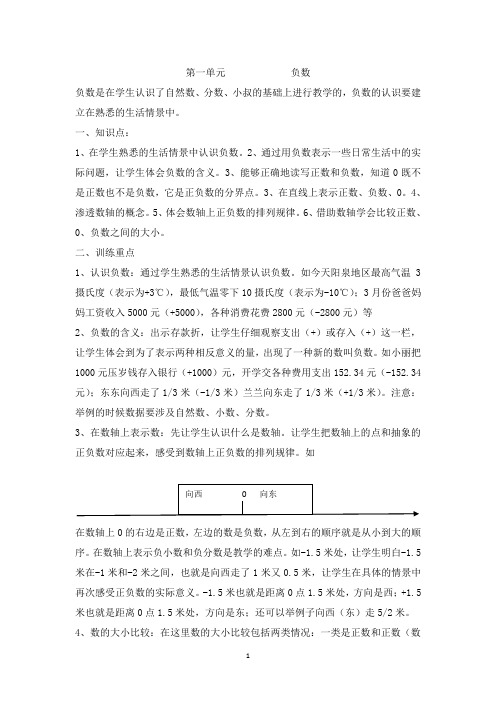
第一单元负数负数是在学生认识了自然数、分数、小叔的基础上进行教学的,负数的认识要建立在熟悉的生活情景中。
一、知识点:1、在学生熟悉的生活情景中认识负数。
2、通过用负数表示一些日常生活中的实际问题,让学生体会负数的含义。
3、能够正确地读写正数和负数,知道0既不是正数也不是负数,它是正负数的分界点。
3、在直线上表示正数、负数、0。
4、渗透数轴的概念。
5、体会数轴上正负数的排列规律。
6、借助数轴学会比较正数、0、负数之间的大小。
二、训练重点1、认识负数:通过学生熟悉的生活情景认识负数。
如今天阳泉地区最高气温3摄氏度(表示为+3℃),最低气温零下10摄氏度(表示为-10℃);3月份爸爸妈妈工资收入5000元(+5000),各种消费花费2800元(-2800元)等2、负数的含义:出示存款折,让学生仔细观察支出(+)或存入(+)这一栏,让学生体会到为了表示两种相反意义的量,出现了一种新的数叫负数。
如小丽把1000元压岁钱存入银行(+1000)元,开学交各种费用支出152.34元(-152.34元);东东向西走了1/3米(-1/3米)兰兰向东走了1/3米(+1/3米)。
注意:举例的时候数据要涉及自然数、小数、分数。
3、在数轴上表示数:先让学生认识什么是数轴。
让学生把数轴上的点和抽象的正负数对应起来,感受到数轴上正负数的排列规律。
如在数轴上0的右边是正数,左边的数是负数,从左到右的顺序就是从小到大的顺序。
在数轴上表示负小数和负分数是教学的难点。
如-1.5米处,让学生明白-1.5米在-1米和-2米之间,也就是向西走了1米又0.5米,让学生在具体的情景中再次感受正负数的实际意义。
-1.5米也就是距离0点1.5米处,方向是西;+1.5米也就是距离0点1.5米处,方向是东;还可以举例子向西(东)走5/2米。
4、数的大小比较:在这里数的大小比较包括两类情况:一类是正数和正数(数值大的数就大);正数和0(正数大于0)另一类是正数和负数(正数大于负数)、负数和0(负数小于0)、负数和负数(数值大的数反而小)。
小学英语六年级下册(牛津译林版)Unit3Ahealthydiet知识点归纳与练习题
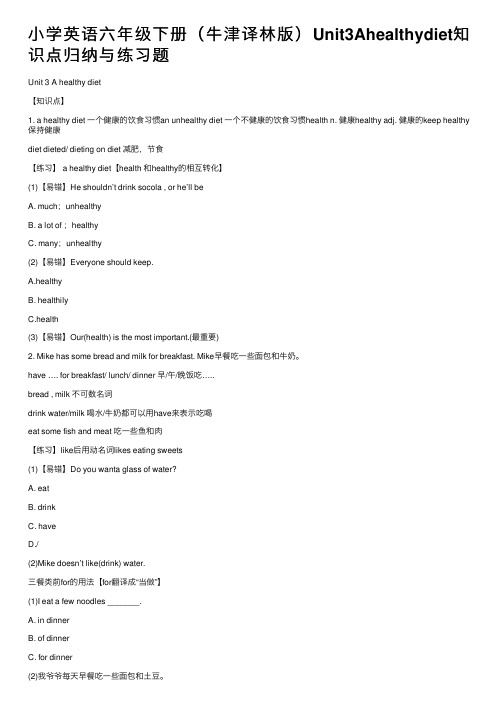
⼩学英语六年级下册(⽜津译林版)Unit3Ahealthydiet知识点归纳与练习题Unit 3 A healthy diet【知识点】1. a healthy diet ⼀个健康的饮⾷习惯an unhealthy diet ⼀个不健康的饮⾷习惯health n. 健康healthy adj. 健康的keep healthy 保持健康diet dieted/ dieting on diet 减肥,节⾷【练习】 a healthy diet【health 和healthy的相互转化】(1)【易错】He shouldn’t drink socola , or he’ll beA. much;unhealthyB. a lot of ;healthyC. many;unhealthy(2)【易错】Everyone should keep.A.healthyB. healthilyC.health(3)【易错】Our(health) is the most important.(最重要)2. Mike has some bread and milk for breakfast. Mike早餐吃⼀些⾯包和⽜奶。
have …. for breakfast/ lunch/ dinner 早/午/晚饭吃…..bread , milk 不可数名词drink water/milk 喝⽔/⽜奶都可以⽤have来表⽰吃喝eat some fish and meat 吃⼀些鱼和⾁【练习】like后⽤动名词likes eating sweets(1)【易错】Do you wanta glass of water?A. eatB. drinkC. haveD./(2)Mike doesn’t like(drink) water.三餐类前for的⽤法【for翻译成“当做”】(1)I eat a few noodles _______.A. in dinnerB. of dinnerC. for dinnerMy grandpasome bread andbreakfastday.重要句型:What do you have for breakfast?你早餐吃什么?What do you often havebreakfast? A. in B. for C. about D. of3. Yang Ling likes sweet food too, but she eats a little at a time. 杨玲也喜欢吃甜⾷,但是她⼀次只吃⼀点点。
六年级下册单词、课文中译英(上海版牛津英语)
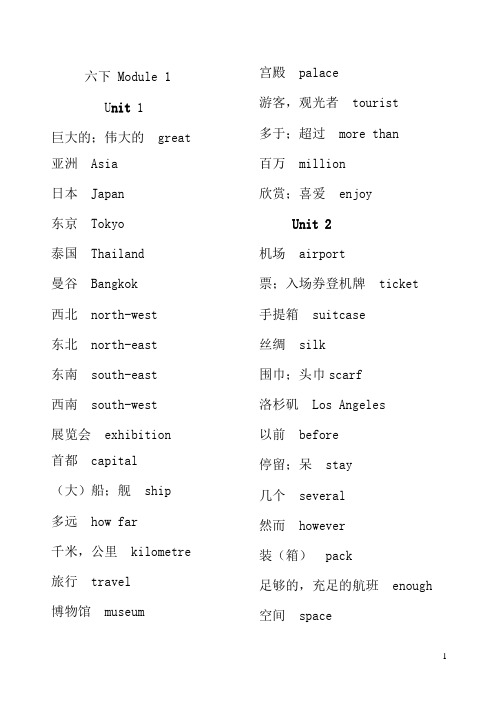
六下 Module 1 U nit 1巨大的;伟大的 great 亚洲 Asia日本 Japan 东京 Tokyo 泰国 Thailand 曼谷 Bangkok西北 north-west 东北 north-east 东南 south-east西南 south-west 展览会 exhibition 首都 capital(大)船;舰 ship多远 how far 千米,公里 kilometre旅行 travel 博物馆 museum宫殿 palace游客,观光者 tourist多于;超过 more than 百万 million欣赏;喜爱 enjoyUnit 2机场 airport票;入场券登机牌 ticket 手提箱 suitcase 丝绸 silk 围巾;头巾scarf 洛杉矶 Los Angeles以前 before停留;呆 stay 几个 several然而 however 装(箱) pack足够的,充足的航班 enough 空间 space去... leave for... 应该 should到达... arrive at... 不得不 have to担心 worry离开,出发 departure 航班 flight乘客;旅客 passenger 护照 passport 登机牌 boarding card带来 bring元(美国,加拿大等货币) dollar 地址 addressUnit 3端午节 Dragon Boat Festival 比赛 race某物,某事 something 庆祝 celebrate 出生(be )born一千 thousand 以前 ago 国家 country 很,非常 very much 劝告,忠告 advice向...提出建议 give advice to...国王 king接受(某人的)劝告 take one ’s advice死,死亡 die 以后,后来 later 输掉,失去 lose战役 battle处于危险中 in danger河,江 river 农历的 lunar 纪念,记得 remember 有,带有 with没有 without 月饼 moon cake甜食,甜点,布丁 pudding 宁愿 would ratherUnit 4 保持 stay 保持健康 stay healthy 室内的 indoor 室外的 outdoor 篮球 basketball 电影,胶片 film 网球 tennis 模型 model去野餐 go on a picnic 邮票 stamp 烧烤野餐 barbecue来一次烧烤野餐 have a barbecue 头痛 headache 胃痛 stomach ache 牙痛 toothache 感冒 cold 发烧 fever 疼痛的 sore 咽喉 throat锻炼,运动 exercise 真正的,的确 really体育运动 sport 忘记 forgetModule 2 Unit 1 在...前面 in front of 有魔力的 magic 寻找 look for 开始 start按钮 button纸币,注释 note 按,压 press 微笑,笑 smile 背面,反面 back...年后 in...years ’time 重的 heavy 厘米 centimetre有...重,称...的重量 weigh 千克,公斤 kilogram宇航员 astronaut 同意 agree 擅长(be )good at 灭火 put out fires 可能的 possibly 苗条的 slim(外貌)好看的 good-looking不擅长,...差的(be )poor at 数学 Maths 练习,训练 practise 学,学习 learn 航天器,宇宙飞船 spacecraft 回来,返回 come backUnit 2季节性的 seasonal 变化 change 生活 life到处,向各处 around 有空调的 air-conditioned 学习 study食堂,餐厅 canteen 保暖 keep warm雪人 snowman 热饮料 hot drink 通知 notice早期的,早先的 early 袖子 sleeve 裤子 trousers短上衣,夹克衫 jacket短裙 skirt短裤 shorts皮带 belt Unit3双层车 double-decker 车费 fare在过去 in the past售票员 conductor 现今 nowadays 单层车 single-decker 大多数 most 没有一个 none 仍然,依旧,还是 still 也许,大概,可能 perhaps 不多的,很少的 few堵车,交通阻塞 traffic jam 轻便摩托车 motorcycle铁路 railway 停车场 car park 桥 bridge人行横道,十字路口 crossing 公共汽车停靠站 bus stopModule 3 Unit 1(使)下沉,(使)沉没 sink 清洁工人 cleaner 愉快的 happily 起先 at first 温和的 gently 轻微的 slightly 缓慢地 slowly 突然 suddenly 快速的 quickly 立即 immediately台风 typhoon 猛烈的 fiercely行进,移动 pass 小心的 carefully 温和的 gentle 拿着,抓住 hold雨衣 raincoat紧紧的 tightly旗,旗帜 flag进行帆板运动 windsurf盆 pot可能 may物体 object (使)破,碎 break波浪 waveUnit 2四分之一 quarter 小河,溪流 stream 地球 earth 鲸 whale聪明的 intelligent海星 starfish 海马 sea horse 有趣的 interesting 重要的 important 污染,弄脏 pollute 覆盖 cover 如果 if淋浴 shower 洗淋浴 take a shower 农作物 crop使用,利用;用途,功能 use节省,节约 save 浪费 waste 修理 fix 滴(漏)水的 dripping 水龙头 tap 流动的 running 关掉 turn off 代替 instead of 沐浴,洗盆浴 bathUnit 3森林 forest 陆地,土地 land 地区 area 窝,巢 nest 洞,孔 hollow 木头 wood砍倒 cut down 找出,查明 find out 环境 environment塑料,塑料制的,塑料的 plastic油,石油 oil 羊毛 wool 棉花,棉布 cotton 玻璃,玻璃杯 glass 沙 sand 材料 material由...制成的(be )made of 木制的 wooden毛纺的,羊毛的 woollen 一件商品(物品)itemModule 1 U nit 1 巨大的;伟大的亚洲日本东京泰国曼谷西北东北东南西南展览会首都(大)船;舰多远千米,公里旅行博物馆宫殿游客,观光者多于;超过百万欣赏;喜爱Unit 2机场票;入场卷登机牌手提箱丝绸围巾;头巾洛杉矶以前停留;呆几个然而装(箱)足够的,充足的航班空间去... 应该到达... 不得不担心 离开,出发航班乘客;旅客 护照 登机牌带来元(美国,加拿大等货币) 地址Unit 3端午节 比赛 某物,某事 庆祝 出生一千 以前 国家很,非常 劝告,忠告向...提出建议国王接受(某人的)劝告 死,死亡 以后,后来输掉,失去 战役 处于危险中 河,江 农历的 纪念,记得 有,带有 没有 月饼甜食,甜点,布丁 宁愿Unit 4保持保持健康室内的室外的篮球电影,胶片网球模型去野餐邮票烧烤野餐来一次烧烤野餐头痛胃痛牙痛感冒发烧疼痛的咽喉锻炼,运动真正的,的确体育运动忘记Module 2Unit 1 在...前面有魔力的寻找开始按钮纸币,注释按,压微笑,笑背面,反面...年后重的厘米有...重,称...的重量千克,公斤宇航员同意擅长灭火可能的苗条的(外貌)好看的不擅长,...差的数学练习,训练学,学习航天器,宇宙飞船回来,返回Unit 2 季节性的变化生活到处,向各处有空调的学习食堂,餐厅保暖雪人热饮料通知早期的,早先的袖子裤子短上衣,夹克衫短裙短裤皮带Unit3 双层车车费在过去售票员现今单层车大多数没有一个仍然,依旧,还是也许,大概,可能不多的,很少的堵车,交通阻塞轻便摩托车铁路停车场桥人行横道,十字路口公共汽车停靠站Module 3Unit 1 (使)下沉,(使)沉没清洁工人愉快的起先温和的轻微的缓慢地突然快速的立即台风猛烈的行进,移动小心的温和的拿着,抓住雨衣紧紧的旗,旗帜进行帆板运动盆可能物体(使)破,碎波浪Unit 2 四分之一小河,溪流地球鲸聪明的海星海马有趣的重要的污染,弄脏覆盖如果淋浴洗淋浴农作物使用,利用;用途,功能节省,节约浪费修理滴(漏)水的水龙头流动的关掉代替沐浴,洗盆浴Unit 3 森林陆地,土地地区窝,巢洞,孔木头砍倒找出,查明环境塑料,塑料制的,塑料的油,石油羊毛棉花,棉布玻璃,玻璃杯沙材料由...制成的木制的毛纺的,羊毛的一件商品(物品)Module 1 U nit 1great AsiaJapan Tokyo Thailand Bangkoknorth-west north-east south-eastsouth-west exhibition capitalshiphow farkilometretravelmuseumpalace touristmore than millionenjoyUnit 2airportticket suitcase silk scarf Los Angelesbeforestay severalhowever packenough spaceleave for... shouldarrive at... have toworrydepartureflightpassenger passport boarding cardbring dollar addressUnit 3 Dragon Boat Festival race something celebrate (be )bornthousand ago country very much advicegive advice to...kingtake one ’s advice die laterlosebattlein danger river lunar remember withwithout moon cake pudding would ratherUnit 4 stay stay healthy indoor outdoor basketball film tennis modelgo on a picnic stamp barbecue have a barbecue headache stomach ache toothache cold fever soreexercise hroat exercise reallysport forgetModule 2 Unit 1in front of magic look for start button note press smile backin...years ’time heavy centimetre weigh kilogramastronaut agree(be )good at put out fires possibly slimgood-looking(be )poor atMaths practise learn spacecraft come backUnit 2seasonal change life aroundair-conditioned study canteen keep warmsnowman hot drink notice early sleeve trousersjacketskirtshortsbelt Unit3double-decker fare in the pastconductor nowadays single-decker most none still perhaps fewtraffic jam motorcyclerailway car park bridge crossing bus stopModule 3 Unit 1sink cleaner happily at first gently slightly slowly suddenly quickly immediatelytyphoon fiercelypass carefully gentle holdraincoattightly flag windsurfpotmayobject breakwaveUnit 2quarter stream earth whale intelligentstarfishsea horseinterestingimportantpollutecoverifshower take a showercropusesavewaste fix drippingtaprunningturn offinstead ofbath Unit 3forest landareanesthollowwoodcut downfind outenvironmentplasticoilwoolcottonglasssandmaterial(be)made ofwoodenwoollenitemModule 1 City lifeUnit 1 Great cities in Asia郭老师和她的学生们在一个关于亚洲著名城市的展览会上. 看这张地图.北京是中国的首都.你们知道哪一个城市是日本的首都?东京是日本的首都. 对了,它在哪里?它在上海的东北部. 哪个城市是......的首都?......是.......的首都.它在哪里?它在上海的........凯蒂:从上海到北京有多远?郭老师:大约是1400公里.艾丽丝:我们怎么样去北京?郭老师:我们可以坐火车去.彼得:从上海到北京坐火车要花费多长时间?郭老师:大约花费十个小时.从上海到.....有多远?它大约.....我们怎么样去......?我们可以坐......去. 乘......从......到......要花费多少时间?大约花费...... 北京是中国的首都. 它在上海的北部.在那儿你能找到博物馆,宫殿和公园.许多旅游者喜欢参观那些地方.他们经常参观长城.在北京有一千六百万多万人.他们喜欢吃饺子. 曼谷是泰国的首都.它在上海的西南. 在曼谷有许多寺庙.许多旅游者喜欢看这些美丽古老的建筑.在曼谷大约有八千万人.他们喜欢吃水果. 他们也喜欢吃辛辣食物.Unit 2 At the airport这个周日王夫人和奶奶打算去美国的洛杉矶去看朱迪姑姑和迈克叔叔. 朱迪姑姑和迈克叔叔已经在洛杉矶住了六年了.王夫人和奶奶以前没有去过美国.他们计划在那儿呆两周. 他们已经做了许多事情.他们已经买了飞机票.奶奶给朱迪姑姑买了许多T恤衫和几条丝绸围巾.他们还没有装箱.“你的箱子里有充足的空间吗?”奶奶问.“是的,我没有太多的东西.我手提箱里有足够的空间装你的衣服和丝绸围巾”王夫人回答到.王先生:明天你们飞机几点起飞去洛杉矶?奶奶:在下午三点钟.王夫人:去飞机场要花费多长时间?王先生:它花费大约一个半小时.王夫人:我们应当几点钟到达飞机场?王先生:我们应当在下午一点钟之前到达.奶奶:噢,不!我们将必须在那儿呆两小时.王先生:别担心.在飞机场有许多商店.王夫人:明天我们打算几点钟离开家?王先生:我们打算在上午十一点半离开家. 你去......的飞机明天几点钟起飞?在中午/下午/晚上.......我应该在几点钟到达机场?你应该在中午/下午/晚上......到达飞机场. 你们已经带了护照吗?是的,我们已经带了我们的护照.你们已经带了你们的登机牌了吗?噢,不!我们还没有带我们的登机牌.Unit 3 Dragon Boat Festival郭老师,我想了解一些关于龙舟节的事情.人们为什么庆祝它?这是龙舟节的传说.屈原在2000年前出生在中国. 他非常热爱他的国家. 他的工作是给国王提建议. 国王总是接受他的建议. 然而,国王死了新国王不听他的话.后来,因为没有采纳屈原的建议,新国王在一次战争中失败了.这个国家处于危难中. 屈原非常难过.他跳进江里死了. 日期是那年阴历的五月初五. 如今,每年那天人们吃粽子和举行龙舟节是为了纪念屈原.你喜欢粽子吗?我喜欢带肉的咸粽子.我喜欢没有豆类的甜粽子.我喜欢没有豆类的甜粽子,但是我不喜欢带肉的咸粽子.我喜欢带豆的甜粽子,但是我不喜欢没有带肉的咸粽子.你想要粽子吗?是的,我喜欢粽子.不,谢谢你.我不喜欢粽子.我想要一块比萨.Unit 4 Staying healthy我喜欢在家玩拼图. 那是我最喜欢的室内活动.我也喜欢玩拼图.我不喜欢玩拼图.我喜欢在操场踢足球.那是我最喜欢的户外运动. 为什么我总是头疼?那是因为你看电视太多了. 我应该做什么?你应该少看电视.为什么我总是感冒?那是因为你没有穿足够的衣服.我应该做什么?你应该多穿衣服.Module 2 ChangesUnit 1 What will I be like?凯蒂正站在一个魔力相机前面.她想用它拍照.首先,凯蒂寻找“START”键.接下来,她把一张20元纸币放进去,然后按了“START”键.然后,她笑着等候红灯.最后,她的相片出来了,她读背面的注释.这是15年后的我. 我将更高更重.我将高165cm. 我将重55kg. 我将更美丽. 我将是一个宇航员. 彼得喜欢帮助人们.他擅长于运动.在15年之后,彼得将是又高又壮.他将高175cm.他将不戴眼镜.他将灭火.我认为15年后彼得将成为一名消防队员. 是的,我同意. 吉尔喜欢听音乐.她擅长于唱歌. 在15年之后,吉尔将又高又苗条. 她将高168cm. 她将重52公斤. 她将会很美丽. 我认为,15年后吉尔将成为一名老师.不,我不同意.她将可能是一名歌手.也许我将成为一个警察或教师,但我想成为一名医生.我擅长于语文,当我不擅长于英语和数学.我必须更多地练习英语和数学.我必须学会怎样让病人更好.Unit 2 Seasonal changes彼得和凯蒂已经拍了一些在他们学校里夏天的生活照.在学校花园里许多花生长在花园里. 许多蜜蜂和蝴蝶在四周飞.在操场上因为天气热,很多学生不喜欢在操场玩.在图书馆许多学生喜欢在图书馆学习. 因为它里面后空调.在餐厅午饭后,许多学生喜欢吃冰激凌和喝软饮料.冬天的校服所有学生必须在十一月下旬、十二月、一月、二月,三月和四月初穿冬季校服. 男生必须穿长袖白色衬衫,灰色裤子,红夹克,灰袜子和黑鞋.女生必须穿有长袖白色上衣,灰色裙子,红色夹克,灰色袜子和黑色鞋子.所有学生必须戴红领巾.Unit 2 Travelling in Garden City许多人喜欢坐公交旅游.在过去,所有的乘客必须从公交售票员处买票.他或者她从乘客中收钱并放在一个包里.现在,许多公交乘客都没必要从售票员处买票.他们把钱放在车费盒里.在过去,仅仅只有单层车. 现在,一些车是双层车.在过去,没有空调车. 现在,大多数是空调车.在过去,没有一个公交司机是女性. 他们所有人都是男性.现在,一些公交司机是女性,但是大多数仍然是男性.10年之后花园城市的交通是什么样子?也许大多数人将乘坐地铁.也许堵车会更少. 也许将会有更多地地铁站.Module 3 The natural worldUnit 1 Windy weather凯蒂和本在公园.他们快乐地放风筝. 开始,风在轻轻的吹.树叶轻轻地晃动. 云在慢慢地移动.突然风变强了. 云快速的移动.大风把风筝刮跑了. 凯蒂和本立刻回家.凯蒂和本在家看电视.风变成了台风并猛烈地刮着. 树木倒了.轮船和小船沉没在大海里. 台风很快地过去了.凯蒂和本慢慢地走在街道上. 他们看到一些工人在打扫街道.郭老师正在询问凯蒂一些关于刮风天气的不同问题.当有微风的时候你能看到什么?我能看到人们正在公园放风筝.Unit2 Sea water and rain water海洋地球几乎四分之三是水.地球上许多鱼和海洋动物住在溪流,河,湖,海和海洋里.鲸,海豚和鲨鱼是海洋动物. 鲸是海洋里最大的动物.海豚是海洋里最聪明的动物. 鲨鱼是海洋里最危险的动物. 在海洋里,你可以找到海星和海马.他们是有趣的和美丽的海洋动物.海洋对地球上所有的动物都是重要的.我们必须保持他们干净.我们必须停止污染水.如果没有雨将会发生什么?在家如果没有雨,我们将没有水喝.如果没有雨,我们将没有水刷牙和洗澡.如果没有雨,我们将没有水洗衣服和洗碗.在工作农民们需要水浇他们田地里的庄稼和蔬菜.如果没有雨,庄稼和蔬菜会死掉. 我们将没有食物去吃.如果没有雨,餐馆里的厨师将没有水做饭.如果没有雨,消防队员将没有水去扑灭火.节约用水!不要浪费!修理一个滴水的龙头. 在淌水的龙头下洗菜. 关掉滴水的龙头. 玩水游戏. 淋浴代替盆浴.在淌水的龙头下刷牙.Unit 3 Forests and land森林森林是由大面积的树组成的.森林对所有动物都是非常重要的.鸟在树上构筑它们的巢.小动物和昆虫在树洞里建造它们的家.树叶,花和水果是它们的食物.一些国家的人们用木头做饭. 他们从森林里获得木头. 我们砍树来制造房子,家具和纸.森林里有许多动物死亡是因为失去那它们的家园和食物.我们必须停止砍伐森林.我们从环境中得到了什么?我们从树得到木材. 我们能用木材造纸.我们从石油中得到塑料. 我们能用塑料制造杯子. 我们从绵羊得到羊毛. 我们从植物中得到棉花. 我们能够石油羊毛和棉花制造衣服.我们从沙子中得到玻璃. 我们用玻璃制造瓶子. 摸摸它.感觉怎么样?它是硬的和粗糙的.它是由什么制成的?它是什么?它是木头制成的.它是一个木头盒子.摸摸它.感到它怎么样?它是柔软的.它是由什么制成的?它是什么?它是由羊毛制成的.它是一条羊毛围巾.。
- 1、下载文档前请自行甄别文档内容的完整性,平台不提供额外的编辑、内容补充、找答案等附加服务。
- 2、"仅部分预览"的文档,不可在线预览部分如存在完整性等问题,可反馈申请退款(可完整预览的文档不适用该条件!)。
- 3、如文档侵犯您的权益,请联系客服反馈,我们会尽快为您处理(人工客服工作时间:9:00-18:30)。
牛津英语上海版六年级下册知识点整理Module1 City lifeUnit1 Great cities in Asian词组:the capital of... ...的首都 north-east东北 from...to...从...到...in the past在过去 the Great Wall长城 more than=over超过eat dumpling吃饺子 tall buildings高楼大厦huge department stores大型的百货商店 a lot of许多语法点:1.Beijing is north of Shanghai.北京在上海的北部。
(1)两地不相邻:A is north of B.(2)所属关系:A is in the north of B.(3)两地接壤:A is on the north of B.2.How far is it from Shanghai to Beijing?从北京到上海有多远?How far... 多远。
询问距离的远近,路程的长远。
3.How long does it take to travel from Shanghai to Beijing by train?坐火车从上海到北京要多久?(1)How long...多久。
询问时间长短。
How long…多长。
用于询物的问长度。
(2)by+交通工具,表示“乘...交通工具”,用How提问。
4.It takes about ten hours.大约需要十小时It takes (sb.) st. to do sth. 做某事需要花费多长时间。
5.They enjoy eating dumplings.他们喜欢吃饺子enjoy/like/love doing sth. 喜欢做某事6.Two and a half days=Two days and a half两天半Half an hour=one and a half hours=one/an hour and a half一个半小时Unit2 At the airport词组:plane ticket机票 silk scarf丝巾 a lot of/plenty of大量的,许多departure time出发时间 leave for出发去某地 have to不得不be going to将要 arrive at到达boarding card登机牌 name tap姓名语法点:1.Aunt Judy and Uncle Mike have lived in Los Angeles for six years.朱迪婶婶和迈克叔叔在洛杉矶已住了六年。
(1)介词for可用于表示一段时间,多与现在完成时连用,表示动作从过去延续到现在的一段时间。
用How long提问。
2.Mrs Wang and Grandma have not been to the USA before. 王太太和奶奶之前没有去过美国。
(1)have/has been to 去过,到过(表示现在已经回来)have/has been in=have lived=stayed in 长时间住在…(2)have/has gone to 去,到...(表示现在还没有回来)3.They have already done a lot of things.她们准备了很多东西。
However, they have not packed their suitcase yet.但是她们还没打包行李箱。
already 已经。
(多用于肯定句,放在动词前)yet 也,还。
(多用于否定句和疑问句,放在句末)just 刚刚。
(和already用法相同)4.I haven’t got too many things.我没有太多东西。
(1)have/has got有,拥有否定形式:haven’t/hasn’t got 疑问形式:Have/Has...got...?(2)too many+可数名词复数 too much+不可数名词5.Have you get enough space in your suitcase?行李箱的空间够大吗? enough + n. adj/adv+ enough5.What time does your plane leave for Los Angeles tomorrow?(1)What time...几点。
(用于问时间)(2)plan n.计划 v.计划 plan to do sth.(3)leave for出发去,动身去... Leave ... for...离开Unit3 Dragon Boat Festival词组:Dragon Boat Festival端午节 jump into跳入dragon boat races龙舟赛 eat rice dumplings吃粽子two hundred years ago两百年前语法点:1.I would like to know something about the Dragon Boat Festival.我想了解一些关于端午节的知识。
(1)would like to do sth.=want to do sth.想要做某事(2)know about了解关于...的事情2.His job was to give advice to the king.他的工作是给国王出谋划策。
(1)be+to do不定式做表语,表示主语和表语在概念上同等(2)give sth. to sb.=give sb. sth.给某人某事(3)advice “建议,劝告”。
不可数名词。
动词形式是advise3.The new did not listen to him.新国王不听信于他。
listen to听信,听从4.The county was in danger.国家处在危难之中。
in danger在危险中 dangerous危险的5.I like sweet rice dumplings without beans.我喜欢吃没有豆子的甜粽子。
with有 without没有6.Would you like some rice dumplings?你想吃粽子吗?Would you like some ...你想要...吗?回答:Yes,please./No,thanks.7.I ‘d rather have a piece of pizza.我宁愿吃一块披萨。
would rather (not) do...宁愿(不)做...8.The fifth day of the fifth lunar month 农历五月初五序数词表按照序号排列:如几号,几楼…生日一定要用序数词Unit 4 Staying healthy 词组:indoor activity室内活动 outdoor activity外活动play football踢足球 play the piano弹钢琴watch television看电视 read a book看书play computer games玩电脑游戏 see a film看电影play tennis打网球 make a model做模型go on a picnic去野炊 collect stamps集邮have a barbecue烧烤 fly kites放风筝have a headache头痛 have a cold感冒have a sore throat喉咙痛 have toothache牙痛have a fever发烧 have a stomach ache胃痛语法点:1.What’s your favourite indoor activities? 你最喜欢的室内活动是什么?What’s your favourite...? 你最喜欢的...是...2.Why do I always have a headache? 为什么我总是头痛?Why 询问原因,回答是:(It’s) because...3.What should I do? 我应该做什么?You should...4.How often do you watch TV?I watch TV four times a day.How often...用于询问频率5. like/love/enjoy+(doing) sth. 喜欢(做)某事/物6. forget doing... 指未做的事 forget to do... 指已做的事remember 与之用法相同7. enough+n. 足够的... adj./adv.+enough足够地8. too much+不可数名词 too many+可数名词复数too little+不可数名词 too few+可数名词复数9. Little---less---least few---fewer many/much---more---most Module2 ChangesUnit5 What will I be like?词组:take a photograph照相 wait for the red light等待红灯look for the “start” button寻找“开始”按钮press the “start” button按“开始”按钮read the note on the back读背面的注释wear glasses戴眼镜 put out fires灭火good-looking漂亮的 come back回来语法点:1.What will I be like? 我将是怎么样的?like做介词,“像”“是什么样子的”eg. What’s the weather like tomorrow?一般将来时:用于表示将来某个时间发生的动作或状态。
常与tomorrow, next+时间词,in+一段时间,in the future等词连用。
其动词形式有will/shall+do或be going to do2.This is me in 15 years’ time.这是我15年以后的样子。
in...years time ...年以后。
与将来时连用,用How soon提问。
3.I’ll be 165 centimetres tall.提问身高用:How tall are you?或What’s your height?I’ll weigh 55 kilograms.提问体重用:How much do you weigh?或What’s your weight?4.be good at (doing) sth 擅长做... be poor at(doing) sth 不擅长做...5.a report on/about my future一篇关于我的未来的报告report v./n.6.I have to practise English and Maths more.我需要更多的练习英语和数学。
